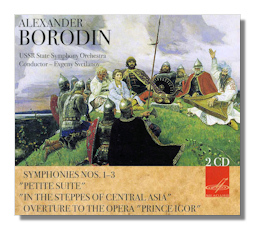
The Internet's Premier Classical Music Source
Related Links
- Borodin Reviews
- Latest Reviews
- More Reviews
-
By Composer
-
Collections
DVD & Blu-ray
Books
Concert Reviews
Articles/Interviews
Software
Audio
Search Amazon
Recommended Links
Site News
 CD Review
CD Review
Alexander Borodin

Orchestral Works
- Symphony #1 in E Flat Major
- Symphony #2 in B minor
- Symphony #3 in A minor
- Petite Suite (orch. by Glazunov)
- In The Steppes of Central Asia
- Overture "Prince Igor"
USSR State Symphony Orchestra/Evgeny Svetlanov
Melodiya MELCD1001946 2CDs ADD
With Melodiya continuing to reissue chunks of its historic catalogue lovers of Russian music are in for a treat. This two-CD set from Evgeny Svetlanov and his USSR State Symphony Orchestra groups the essence of Alexander Borodin's symphonic work. Although recorded over some twenty years, between 1963 and 1983, Svetlanov's survey shows remarkable cohesion in approach and result. All titles considered here have been released several times, yet Borodin isn't particularly overrepresented either on disc or in the concert-hall, making this nicely packaged twofer very welcome. Incidentally, Svetlanov went on to record another Borodin Symphonies cycle for RCA in the 1990s, but this older Melodiya set is by all means preferable.
Alexander Borodin's three symphonies cover a period of twenty-five years. As is well known, for this full-time chemist composing was a day off pastime and much what we hear here has been completed or arranged by others. But what there is, is never devoid of interest, often truly fascinating, with experiments in sonority, color and texture thrown in, and leaving us to wonder what a great composer Borodin could have been had he chosen a career as a professional musician. His First Symphony was begun when he joined Mily Balakirev's "Mighty Handful" circle in 1862 but only completed in 1867. The Second followed in 1876 after some seven years of work. The Third Symphony was left incomplete at Borodin's death in 1887. Alexander Glazunov reconstructed the first movement from memory adding a Scherzo intended for a quartet in accordance with Borodin's will.
The characteristic Borodin blend of opulent sonorities, sweeping dynamism and powerful, near operatic statements suit Svetlanov like a glove and he makes a convincing case for all three symphonies. This music breathes a genuine epic, almost Beethovenian grandeur tempered by lovingly nostalgic reflections. Svetlanov molds the tempi in his incomparable manner to magnify the dramatic impact, as in the 1st movement of the Second, but the result is never anything less than compelling. The First Symphony, too, has an irresistible drive in Svetlanov's hands, marked by prominent timpani and raw brass (if not excessively so). Yet it is in the Andante with its subtly oriental timbres and solemnity that we find Svetlanov at his most beguiling.
The Petite Suite initially composed for piano in 1885 is a characterful collection of narrative and dance pages. Svetlanov brings it to life in full technicolor and turns the sometimes overdone Glazunov orchestration (Borodin never heard it in this manner) into an asset. The ubiquitous In The Steppes of Central Asia is well-paced and beautifully atmospheric, with superb strings and woodwinds. The set is completed by a thrilling, hard-driven performance of the Overture to Prince Igor, Borodin's unfinished opus magnum on which he labored for some eighteen years. The Overture was also reconstructed from memory and orchestrated by Glazunov.
The USSR State Symphonic Orchestra highlights in its inimitable manner Borodin's colorful palette and occasional dissonant experiments, but also offers some stunningly precise playing in the brisk passages. We needn't expect any sonic miracles from this source and as noted with the Glazunov/Raymonda release (Melodiya MELCD1001959) contented itself with repackaging sans proper remastering. The closely miked recordings from 1963-66 (the Second Symphony, Prince Igor and In the Steppes of Central Asia) have a harsher sound and tend to saturate in the louder passages, but nothing really that would keep this set from being a prime choice.
Copyright © 2012, Marc Haegeman





















